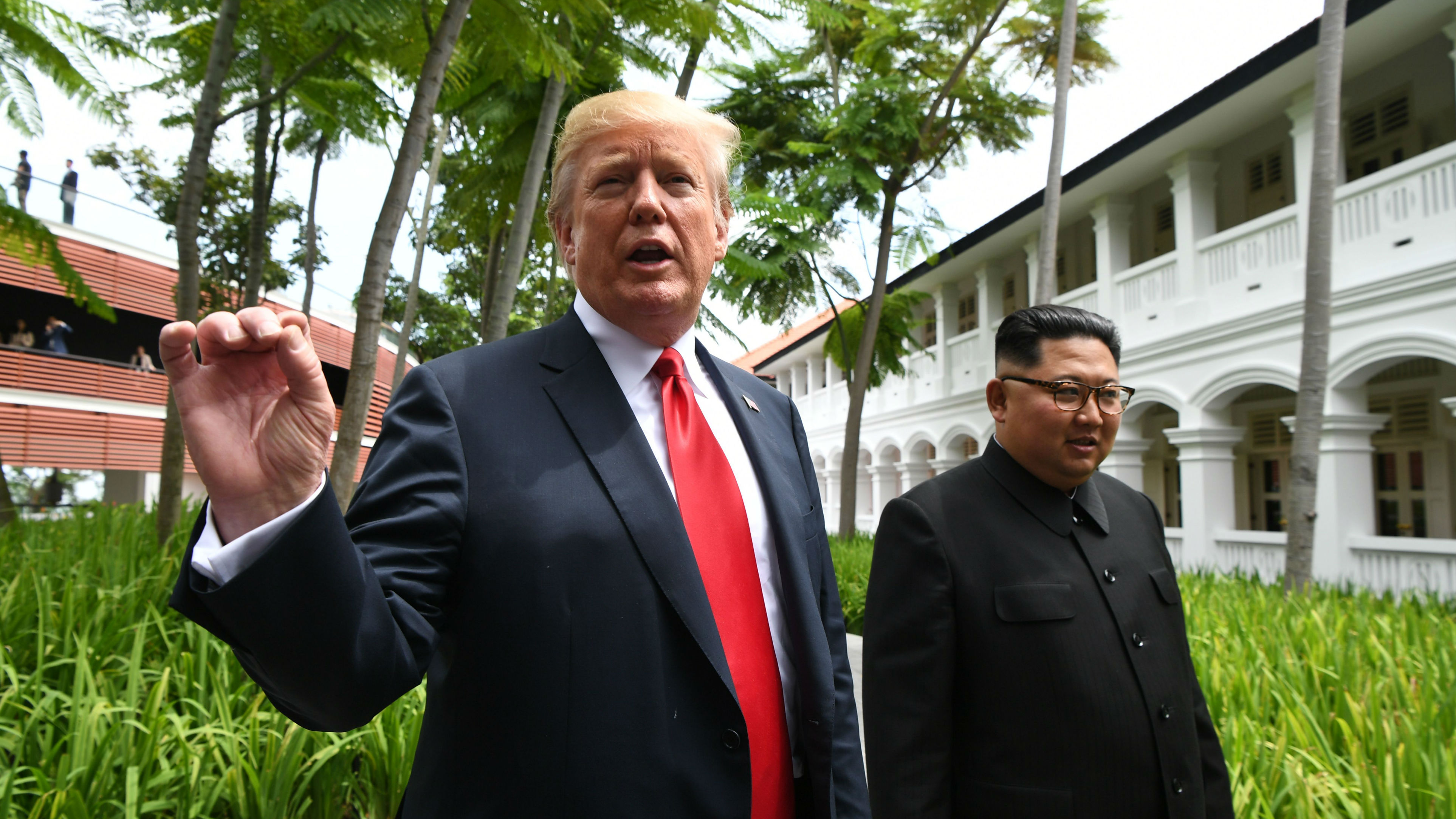Has the US-North Korea summit been a victory for peace?
Kim Jong Un promises ‘world will see a major change’ following unprecedented talks with Donald Trump

A free daily email with the biggest news stories of the day – and the best features from TheWeek.com
You are now subscribed
Your newsletter sign-up was successful
North Korean leader Kim Jong Un has committed to rid his country of nuclear weapons, during a historic meeting with US President Donald Trump.
The two men shook hands, ate lunch together and signed a joint document, stating - among other points - that North Korea “commits to work towards the complete denuclearisation of the Korean Peninsula”.
Trump described today’s talks in Singapore as “honest, direct and productive”, and told a gathering of international reporters that he would end America’s “war games” with Pyongyang. Meanwhile, Kim promised that “the world will see a major change”.
The Week
Escape your echo chamber. Get the facts behind the news, plus analysis from multiple perspectives.

Sign up for The Week's Free Newsletters
From our morning news briefing to a weekly Good News Newsletter, get the best of The Week delivered directly to your inbox.
From our morning news briefing to a weekly Good News Newsletter, get the best of The Week delivered directly to your inbox.
The meeting was a “victory for peace”, writes Freddy Gray in the US edition of the Spectator.
“Trump has just given the North Korean people more hope than any other previous American president,” he continues, drawing comparisons with Ronald Reagan’s meeting with the Soviet Union’s Mikhail Gorbachev in 1986, which led to the Intermediate-Range Nuclear Forces Treaty.
“Trump has changed the realpolitik of the Korean Peninsula”, and that’s “no small feat”, Gray adds.
But others have been cautious about lauding Trump’s supposed success.
A free daily email with the biggest news stories of the day – and the best features from TheWeek.com
“It is unclear if further negotiations will lead to the end goal of denuclearisation,” Anthony Ruggiero, senior fellow of Washington DC-based think tank Foundation for Defense of Democracies, told Reuters. “This looks like a restatement of where we left negotiations more than ten years ago and not a major step forward.”
USA Today’s Susan Page argues that the leaders’ handshake was more historic than their words. The four-point agreement “fell short of previous international accords reached with Pyongyang and left big questions unanswered”, she says.
Trump indicated that tough sanctions on North Korea would be removed once the denuclearisation process was well under way, and said the US would stop staging joint military exercises with South Korea. But as Page points out, there are no deadlines, no timetables and no commitment to “complete, verifiable and irreversible” nuclear disarmament.
The language in today’s agreement was similarly vague to that in Kim’s April agreement with South Korean President Moon Jae-in, she says, adding: “And it left unmentioned North Korea’s notorious human-rights abuses.”
According to The Washington Post, the agreement essentially “fell short of the kind of deal the US president himself has long said is needed”, leaving Trump “open to criticism that he has given Kim what he has long wanted - recognition, respect and legitimacy on the world stage as an equal - without getting anything substantive on nukes in return”.
-
 Britain’s ex-Prince Andrew arrested over Epstein ties
Britain’s ex-Prince Andrew arrested over Epstein tiesSpeed Read The younger brother of King Charles III has not yet been charged
-
 Political cartoons for February 20
Political cartoons for February 20Cartoons Friday’s political cartoons include just the ice, winter games, and more
-
 Sepsis ‘breakthrough’: the world’s first targeted treatment?
Sepsis ‘breakthrough’: the world’s first targeted treatment?The Explainer New drug could reverse effects of sepsis, rather than trying to treat infection with antibiotics
-
 Will increasing tensions with Iran boil over into war?
Will increasing tensions with Iran boil over into war?Today’s Big Question President Donald Trump has recently been threatening the country
-
 Corruption: The spy sheikh and the president
Corruption: The spy sheikh and the presidentFeature Trump is at the center of another scandal
-
 Rubio boosts Orbán ahead of Hungary election
Rubio boosts Orbán ahead of Hungary electionSpeed Read Far-right nationalist Prime Minister Viktor Orbán is facing a tough re-election fight after many years in power
-
 Greenland’s capital becomes ground zero for the country’s diplomatic straits
Greenland’s capital becomes ground zero for the country’s diplomatic straitsIN THE SPOTLIGHT A flurry of new consular activity in Nuuk shows how important Greenland has become to Europeans’ anxiety about American imperialism
-
 Epstein files topple law CEO, roil UK government
Epstein files topple law CEO, roil UK governmentSpeed Read Peter Mandelson, Britain’s former ambassador to the US, is caught up in the scandal
-
 Iran and US prepare to meet after skirmishes
Iran and US prepare to meet after skirmishesSpeed Read The incident comes amid heightened tensions in the Middle East
-
 Which way will Trump go on Iran?
Which way will Trump go on Iran?Today’s Big Question Diplomatic talks set to be held in Turkey on Friday, but failure to reach an agreement could have ‘terrible’ global ramifications
-
 Israel retrieves final hostage’s body from Gaza
Israel retrieves final hostage’s body from GazaSpeed Read The 24-year-old police officer was killed during the initial Hamas attack